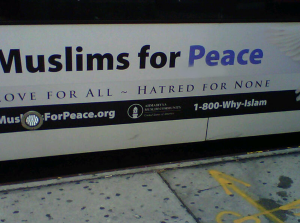You know your Creator when you love his creation. If everyone remembers and practices this, there will not be any enmity in anyone’s heart … That is how you create peace in the world” ~ Hazrat Mirza Masroor Ahmad, 5th Khalifa of the Promised Messiah
 The word “Islam” literally means “peace” as well as “submission.” The word “Islam,” therefore, helps define peace – and how it is attained. Since God has created man in accordance with His attributes, peace requires man to acquire Godly attributes – i.e. to submit to God. The Holy Quran states, “It is in the remembrance of Allah that hearts find peace” (13:29). Peace, therefore, is harmony between God’s attributes and man’s attributes.
The word “Islam” literally means “peace” as well as “submission.” The word “Islam,” therefore, helps define peace – and how it is attained. Since God has created man in accordance with His attributes, peace requires man to acquire Godly attributes – i.e. to submit to God. The Holy Quran states, “It is in the remembrance of Allah that hearts find peace” (13:29). Peace, therefore, is harmony between God’s attributes and man’s attributes.
SOCIAL PEACE
In accordance with the Islamic philosophy of peace, Islam draws a connection between service to mankind and peace. Prophet Muhammad declared, “One who is not grateful to man is not grateful to God” (Tirmidhi). The statement echoes a point of pride for Muslims found in the Quran, “You are the best people raised for the good of mankind; you enjoin what is good and forbid evil and believe in Allah.” (3:111).
INTER-RELIGIOUS PEACE
In accordance with its philosophy of peace, Islam ensures peace between Muslims and non-Muslims. The Holy Quran (2:63; 3:114-116; 5:70; 7:160) declares that no single religion has exclusive control over who enjoys salvation. The Holy Quran (4:165; 16:37; 35:25) declares that every people have been sent at least one prophet. The Holy Quran (2:286; 4:151) further recognizes no distinction in the truthfulness of any prophet. While Islam recognizes Prophet Muhammad as the greatest prophet, Islam also instructs Muslims to not discuss such matters as to injure others feelings.
ECONOMIC PEACE
In accordance with the Islamic philosophy of peace, Islamic places heavy emphasis on an equitable and dynamic economic  system. Islam argues for an economic model rooted in social welfare, confining the pursuit of self-interest within the confines of Rahimiyyat. A divine attribute, Rahim connotes the idea of mercy, giving, and rewarding. An Islamic economic system allows for capitalism but does not allow reward for one’s labor at another’s expense – economic self-interest requires it being beneficial to one’s neighbor. For example, Prophet Muhammad stated, “Pay the laborer his wages before his sweat becomes dry” (Ibn Majah)
system. Islam argues for an economic model rooted in social welfare, confining the pursuit of self-interest within the confines of Rahimiyyat. A divine attribute, Rahim connotes the idea of mercy, giving, and rewarding. An Islamic economic system allows for capitalism but does not allow reward for one’s labor at another’s expense – economic self-interest requires it being beneficial to one’s neighbor. For example, Prophet Muhammad stated, “Pay the laborer his wages before his sweat becomes dry” (Ibn Majah)
